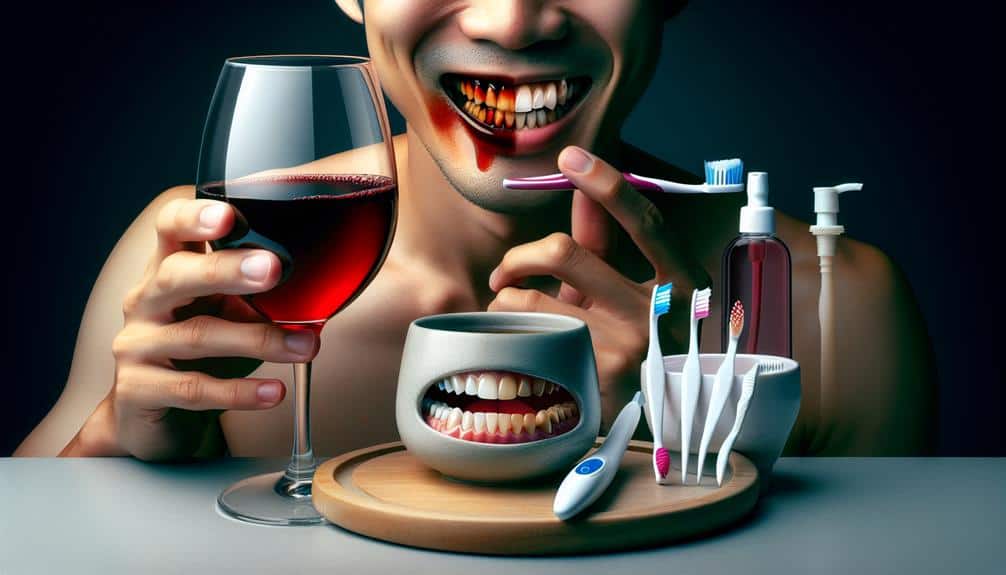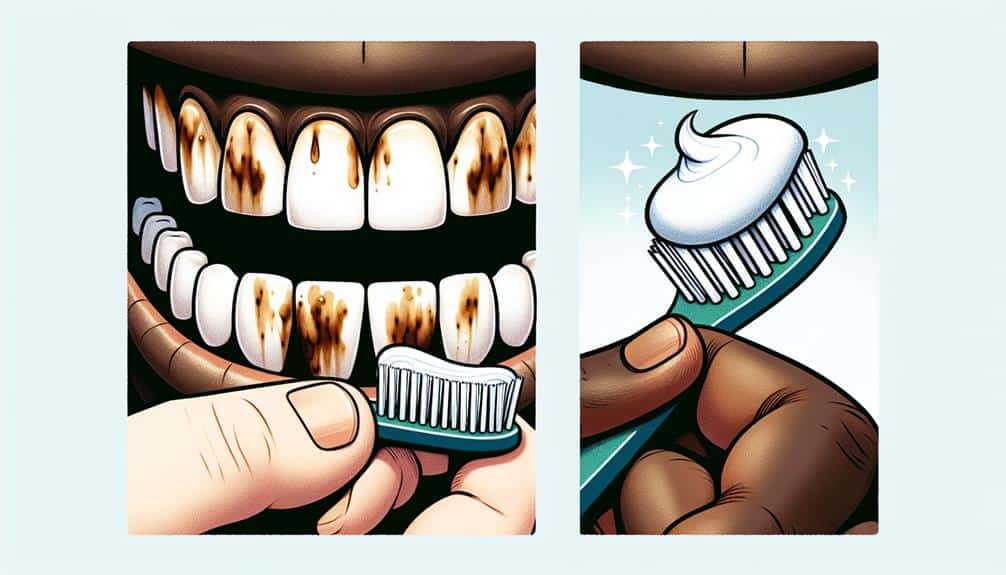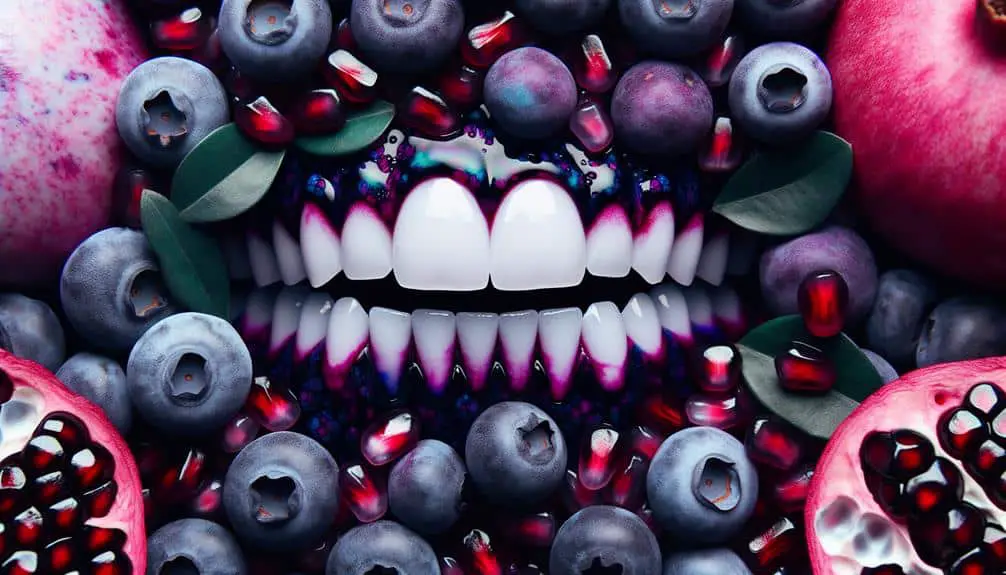To prevent mustard and ketchup staining on your teeth, be mindful of how these condiments can cause gradual discoloration due to pigmented compounds that stick to your enamel. Limit your consumption of pigmented foods, rinse your mouth after eating, brush with fluoride toothpaste, and floss daily to keep your smile bright. Additionally, consider teeth whitening tips like using baking soda, hydrogen peroxide, or activated charcoal, and explore professional treatments for a radiant smile. Mastering these preventative measures can help you maintain a healthy and stain-free smile.
Key Points
- Rinse mouth with water after consuming mustard and ketchup to reduce pigmented compound adherence.
- Brush teeth with fluoride toothpaste after eating to prevent staining from condiments.
- Limit intake of highly pigmented foods like mustard and ketchup to avoid discoloration.
- Floss daily to remove food particles that can contribute to teeth staining.
- Implement preventative measures like regular dental check-ups to address any staining concerns promptly.
The Impact of Mustard and Ketchup
To understand the impact of mustard and ketchup on teeth, it's important to recognize their potential staining effects and how they can contribute to dental discoloration. Your condiment choices play a significant role in your oral health implications. Mustard and ketchup, commonly used in burgers, hot dogs, and sandwiches, contain pigmented compounds that can adhere to the enamel of your teeth. These condiments have intense colors due to ingredients like turmeric in mustard and tomatoes in ketchup. When consumed frequently, these pigments can gradually stain your teeth, leading to aesthetic concerns and potential oral health issues.
Being mindful of your condiment intake and considering alternatives can help minimize staining. Opting for lighter condiments or rinsing your mouth with water after consumption can reduce the impact on your teeth. Regular dental hygiene practices such as brushing and flossing can also aid in preventing and managing stains caused by mustard and ketchup. Understanding the implications of your condiment choices is vital in maintaining a bright and healthy smile.
Common Foods That Stain Teeth
Common foods rich in pigmented compounds have the potential to stain teeth, affecting your smile's brightness and overall oral health. When consumed regularly, these foods can lead to discoloration that may be challenging to remove.
Here are some common culprits to watch out for:
- Coffee Stains: Coffee contains intense color compounds that can adhere to the enamel, causing yellowish or brownish discoloration over time.
- Wine Discoloration: Red wine, in particular, is notorious for staining teeth due to its deep pigmentation. White wine is acidic, which can weaken enamel and make it more susceptible to other staining foods.
- Berries: Blueberries, blackberries, and other deeply pigmented fruits can leave stains on teeth, impacting their whiteness.
- Curry: The vibrant pigments in curry dishes can also lead to staining of the teeth, especially if consumed frequently.
Being mindful of these foods and practicing good oral hygiene can help mitigate their staining effects and preserve your smile's radiance.
How Mustard and Ketchup Stain
Mustard and ketchup can stain teeth due to their vibrant pigmented compounds that adhere to the enamel, potentially causing discoloration over time. The condiment consequences of these popular toppings are linked to their rich colors, particularly the bright yellow of mustard and deep red of ketchup. These pigments contain chromogens, compounds notorious for their ability to discolor surfaces they come into contact with, including tooth enamel.
When these condiments are consumed frequently or in large amounts, the pigmented molecules can build up on the teeth, leading to yellow stains that compromise the natural whiteness of your smile. In addition, the acidity in these condiments can contribute to enamel erosion, making teeth more susceptible to staining and damage over time.
To prevent these dental damages, understanding how mustard and ketchup stain teeth is important in implementing effective preventative measures.
Preventative Measures for Staining
Understanding effective strategies to prevent mustard and ketchup stains on your teeth is key to maintaining a bright, healthy smile. To safeguard your pearly whites, consider the following tips:
- Dietary Precautions
- Limit consumption of highly pigmented foods like mustard and ketchup.
- Rinse your mouth with water after consuming stain-causing foods to minimize their impact on your teeth.
- Oral Hygiene Strategies
- Brush your teeth at least twice a day with a fluoride toothpaste to remove surface stains.
- Floss daily to eliminate plaque buildup between teeth, reducing the chances of staining.
Teeth Whitening Tips for Stains
To effectively address teeth stains, consider incorporating proven teeth whitening techniques into your oral care routine. When dealing with stains, it's crucial to explore both home remedies and professional treatments for best outcomes.
Home remedies like baking soda, hydrogen peroxide, and activated charcoal can help gently remove surface stains. Brushing with baking soda or using hydrogen peroxide as a mouthwash in moderation can aid in brightening your teeth. Activated charcoal, when used correctly, can also absorb stains and toxins from the teeth, promoting a whiter appearance.
For more stubborn or severe stains, professional treatments such as in-office whitening procedures or dentist-prescribed at-home whitening kits may be necessary. In-office treatments often involve stronger whitening agents that can deliver quicker and more noticeable results. Dentist-prescribed at-home kits provide a more controlled approach to whitening under professional guidance.
Frequently Asked Questions
Can Mustard and Ketchup Stains on Teeth Be Removed With Regular Brushing and Flossing?
Regular brushing and flossing help maintain oral health and prevent stains. While mustard and ketchup stains may require professional cleaning, consistent dental visits and proper brushing technique can aid in minimizing discoloration.
Are There Any Natural Remedies or DIY Methods to Prevent Mustard and Ketchup Staining on Teeth?
To prevent mustard and ketchup staining on teeth, consider natural remedies and DIY methods. Incorporate preventive measures like oil pulling, baking soda paste, or apple cider vinegar rinse. These can aid in stain removal and maintain dental health.
How Soon After Consuming Mustard and Ketchup Should I Brush My Teeth to Prevent Staining?
After indulging in mustard and ketchup, swift action is key. Brush immediately to thwart staining and maintain a vibrant smile. Swift dental care post-consumption can aid in stain removal and promote oral health.
Can Using a Straw When Consuming Mustard and Ketchup Help Prevent Staining on Teeth?
Using straws while consuming mustard and ketchup can potentially reduce teeth staining. DIY remedies for stain prevention include timely brushing and specific dental hygiene products. Experiment with these methods to find what works best for you.
Are There Any Specific Toothpaste or Mouthwash Products That Are Effective in Removing Mustard and Ketchup Stains From Teeth?
To effectively combat mustard and ketchup stains on teeth, consider stain-fighting toothpaste and mouthwash effectiveness. Look for toothpaste options with proven stain prevention capabilities. Pairing these products with proper oral hygiene practices can help maintain a bright smile.




